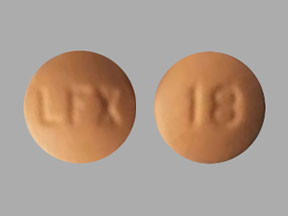Lucemyra Disease Interactions
There are 5 disease interactions with Lucemyra (lofexidine).
Lofexidine (applies to Lucemyra) hypotension
Major Potential Hazard, Moderate plausibility. Applicable conditions: Cerebral Vascular Disorder, Myocardial Infarction, Renal Dysfunction, Heart Disease, Syncope
Lofexidine can cause a decrease in blood pressure, a decrease in pulse, and syncope. It is recommended to monitor vital signs before dosing and for symptoms related to bradycardia and orthostasis. If clinically significant or symptomatic hypotension and/or bradycardia occur, the next dose of lofexidine should be reduced in amount, delayed, or skipped. Avoid using lofexidine in patients with severe coronary insufficiency, recent myocardial infarction, cerebrovascular disease, chronic renal failure, and in patients with marked bradycardia.
References
- (2018) "Product Information. Lucemyra (lofexidine)." US WorldMeds LLC
Lofexidine (applies to Lucemyra) alcoholism
Moderate Potential Hazard, Moderate plausibility.
Lofexidine can potentiate the CNS depressive effects of alcohol and other CNS depressive substances. Care should be exercised when using this agent in patients with alcohol disorders.
References
- (2018) "Product Information. Lucemyra (lofexidine)." US WorldMeds LLC
Lofexidine (applies to Lucemyra) hepatic impairment
Moderate Potential Hazard, Moderate plausibility. Applicable conditions: Liver Disease
Hepatic impairment slows the elimination of lofexidine, but exhibits less effect on the peak plasma concentration following a single dose. Dosage adjustments are recommended based on the degree of hepatic impairment. Close monitoring is recommended when using this agent in patients with hepatic impairment.
References
- (2018) "Product Information. Lucemyra (lofexidine)." US WorldMeds LLC
Lofexidine (applies to Lucemyra) QT prolongation
Moderate Potential Hazard, Moderate plausibility. Applicable conditions: Arrhythmias, Electrolyte Abnormalities, Renal Dysfunction, Liver Disease
Lofexidine prolongs the QT interval. Its use should be avoided in patients with congenital long QT syndrome. It is recommended to monitor ECG prior to and during treatment in patients with congestive heart failure, bradyarrhythmias, hepatic impairment, renal impairment, or patients taking other medicinal products that lead to QT prolongation (e.g., methadone). Electrolyte abnormalities must be corrected prior to initiating therapy.
References
- (2018) "Product Information. Lucemyra (lofexidine)." US WorldMeds LLC
Lofexidine (applies to Lucemyra) renal impairment
Moderate Potential Hazard, Moderate plausibility. Applicable conditions: Renal Dysfunction
Renal impairment slows the elimination of lofexidine but exhibits less effect on the peak plasma concentration than on AUC values following a single dose. Dosage adjustments are recommended based on the degree of renal impairment. Only a negligible fraction of the lofexidine dose is removed during a typical dialysis session, so no additional dose needs to be administered after a dialysis session; therefore, the agent may be administered without regard to the timing of dialysis. Close monitoring is recommended when using this agent in patients with renal impairment.
References
- (2018) "Product Information. Lucemyra (lofexidine)." US WorldMeds LLC
Lucemyra drug interactions
There are 548 drug interactions with Lucemyra (lofexidine).
Lucemyra alcohol/food interactions
There is 1 alcohol/food interaction with Lucemyra (lofexidine).
More about Lucemyra (lofexidine)
- Lucemyra consumer information
- Check interactions
- Compare alternatives
- Pricing & coupons
- Reviews (43)
- Drug images
- Side effects
- Dosage information
- Patient tips
- During pregnancy
- FDA approval history
- Drug class: antiadrenergic agents, centrally acting
- Breastfeeding
- En español
Related treatment guides
Drug Interaction Classification
| Highly clinically significant. Avoid combinations; the risk of the interaction outweighs the benefit. | |
| Moderately clinically significant. Usually avoid combinations; use it only under special circumstances. | |
| Minimally clinically significant. Minimize risk; assess risk and consider an alternative drug, take steps to circumvent the interaction risk and/or institute a monitoring plan. | |
| No interaction information available. |
Further information
Always consult your healthcare provider to ensure the information displayed on this page applies to your personal circumstances.


